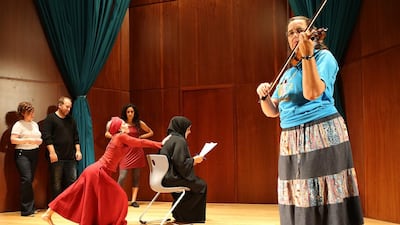In the 1960s, a group of Yemenis fleeing looters and gangs in their home country battled against the odds to reach the shelter of the Trucial States.
Among them was Dhuwaya Al Menhali who, until recently, had buried the memory. When she finally recalled her experienced, it triggered both heartache and mirth.
Her recorded, unedited personal account of the time will be re-enacted by her 23-year-old daughter, Shaikha Al Menhali, tomorrow in Memories of Childhood, an all-female debut production by Documentary Theatre Abu Dhabi.
Documentary theatre is a type of stage dramatisation built on spoken records, film archives, original documentation and historical facts that explores past events and societal issues.
The group was founded by Zayed University professor Nezar Andary in association with Abu Dhabi Music and Arts Foundation, and marks the first attempt to bring documentary-style storytelling to the stage in the UAE.
The concept
Documentary theatre’s powerful fusion of factual content and expressionism dates back to the 1920s, when shows in America and Germany were used as a stage for exposing political scandals. Theatre groups around the world have revived the genre to paint a realistic picture of history and current affairs.
“It’s a type of theatre that is not just for actors,” says Andary, an assistant professor of film and literature. “It’s for researchers as well. It can connect to social issues, from human trafficking to lost histories.”
British actor Alan Rickman, who died in January, was a big influence on Andary’s desire to bring the concept to the UAE.
"He created the play My Name Is Rachel Corrie, based on an American activist's diary and emails," he says. "And I thought that's something that should be done more in the Arab world."
Along with Lebanese actor and director Yara Bou Nassar, Andary applied for an Admaf grant last June to set up the group and organise acting workshops. Now they are ready to stage their first show and aim to put on an annual production, focusing on social issues affecting the country and its residents, giving a voice to different segments of the population.
First-hand accounts
After an open-casting call, five first and second-generation residents, Emiratis and expatriates, were chosen and asked to interview their mothers or grandmothers about an important childhood memory, and develop a script around it.
“It’s like this: instead of having museum pieces, such as your grandmother’s brush, you can actually perform the emotion that went into the brush,” says Andary, who is directing the production.
The actors will perform eight-minute monologues in Arabic and English, based on a single moving recollection or a collection of memories. Their performances will be supported by video footage, photographs and audio clips.
“Our type of theatre is not verbatim, but the type that focuses on an emotional memory and teasing that out,” says Andary.
“The powerful relationship with our mothers and fathers, and their own memories, is actually extremely radical as a project because we define ourselves by the memories of others, too, and that’s been an amazing discovery for me in this project.”
The stories
As part of the research for her monologue, Al Menhali, an Emirati humanities and social sciences student at the university, tracked down one of the travellers who was part of her mother’s group, who recorded a sound bite to use during the performance.
“My mother told me about when she fell off a camel and how she suffered during that journey,” she says.
“I’ll be sharing that, but what was more exciting for me was to find this Yemeni man whom she said used to sing all the time. I did some research and found him in Al Ain. I got him to sing for me. When I played the recording to my mother, she was overjoyed and plays it over and over again.”
Palestinian teacher Farah Chamma, who lives in Dubai, says what began as a casual conversation turned out to be a very enlightening discussion about her mother’s personality when she was a teenager.
“There is a skirt she had, and that story embodies her struggle as a teenager,” she says. “The skirt is symbolic and I’ll be trying to tell her story by talking like her and moving like her on stage.”
• Memories of Childhood is at the Institute of Applied Technology Female Campus on April 6 at 8pm. Admission is free. For reservations, email documentarytheatreabudhabi@gmail.com. For more information, follow Documentary Theatre Abu Dhabi on Facebook
aahmed@thenational.ae

